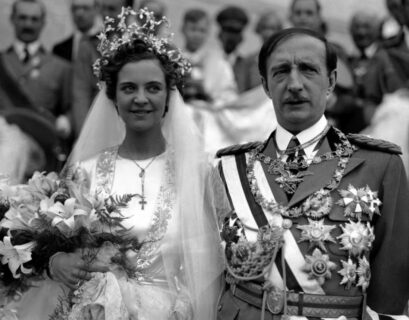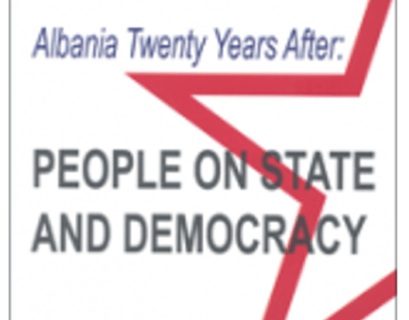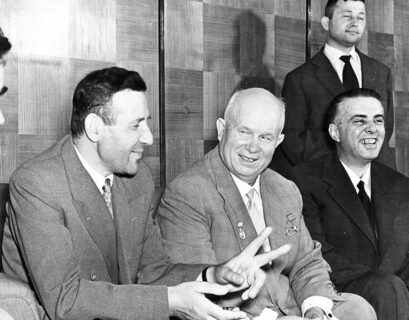By Peter Lucas
As sometimes happens in life, you search for one thing and find another.
So, it was when, following the publication of my book Rumpalla, Rummaging Through Albania in 2002, I sought to do a book on Enver Hoxha.
But that project, for a variety of reasons, went nowhere. One main reason was that men who had served under Hoxha were reluctant to talk about him. Others who served with him said they really did not know him. I quickly found out that looking for Hoxha was like searching for a ghost. I dropped the project.
Then, by chance, I came across the just published book Albania’s National Liberation Struggle: The Bitter Victory by Reginald Hibbert, a scholar who had served with the British SOE (Special Operations Executive) in Albania during World War II.
In that book was a picture of Hoxha and his entourage marching into Tirana November 28, 1944 after the Germans had left. Listed along with Hoxha in the photo were Koçi Xoxe, Myslim Peza, Omer Nishani, Mehmet Shehu, Baba Faja, Spiro Moisiu, British Captain Marcus Lyon and, to my amazement was an American soldier, Captain Tom Stefan, identified only as “US Liaison Officer.”
That immediately piqued my interest. What was an American soldier with an Albanian sounding name doing with Hoxha in Tirana in 1944? I did not know there had been any Americans in Albania during World War II. Nobody knew.
Not only was that a surprise, but also the fact that the United States supported Hoxha and the Communist partisans in their war against the Nazi Occupation. What I also found was that while Hoxha was battling the Germans, he was also fighting the Balli Kombetar, which was aligned with the Nazis.
To add to the confusion was the fact that the British were providing supplies to the Balli, using the Balli as a prop against Hoxha and the communists.
How did this all come about? And who was this Captain Tom Stefan? I decided to find out. It took some time to find him because no one knew what happened to him in the years following the war. And when I finally did find him, it was too late. He was dead. He is buried in a cemetery in Laconia, New Hampshire. Laconia is a fine New England town set in the middle of mountains and lakes. He grew up there after his parents moved there from Boston.
Before that, though, I did find and interview four men of the OSS (Office of Strategic Services) who served with him at Odriçan and Helmes and Tirana. I also found other people who had met Stefan in Albania. There were also extensive files and records of the OSS in Albania stored at the National Archives and Records Administration in College Park, Maryland.
Through records and messages, I found that Tom Stefan had lived through an extraordinary time in Albania at the side of Hoxha, a man he got to know better than anyone else. Stefan also got to know and made friends with Omer Nishani, Myslim Peza, Mehmet Shehu and all the other partisan leaders during the war. He even got to know Koçi Xoxe, although he never trusted him, and with good reason.
Before the U.S. Army, Stefan, after graduating high school and hoping to become a lawyer, worked in an Albanian owned restaurant called the Arch Street Tavern in Boston and attended college at night. He wanted to become a lawyer. The owners spoke to Tom in Albanian, which he understood, having spoken it at home. His parents, Eftim and Emma Stefan had migrated to the United States from Korca.
Stefan’s life changed dramatically after the Japanese bombed Pearl Harbor in Hawaii on December 7, 1941 which led to the beginning of World War II for the U.S.
Stefan did not wait to be drafted but instead volunteered to join the U.S. Army April 10, 1942, four months after war was declared. He soon became an officer and attended military intelligence school. He joined the Office of Strategic Services (OSS), which was the wartime forerunner of the CIA ( Central Intelligence Agency) August 18, 1943. He was welcomed into the newly formed unit because he could speak Albanian.
Unlike the British, the Americans were new to the practice of intelligence gathering and espionage when World War II broke out. The OSS was established only after the disaster of December 7, 1941 when the United States was caught by surprise by the Japanese attack on Pearl Harbor.
General William Donovan, a hero of World War I, was named head of the new intelligence agency. One of Donovan’s first initiatives was to enlist immigrants and sons of immigrants to train and send back to their countries of origin to gather intelligence and to fight with partisans behind enemy lines. These Americans would know the land and the language of their countries and would be able to blend in and be effective.
One of Stefan’s first jobs as an OSS officer was to help recruit newly arrived or established Albanian immigrants for the OSS. The agency needed recruits who could speak foreign languages. In a war that stretched around the globe and included countries with many different cultures and languages, the OSS needed all the men who knew those cultures and languages. Albanian was one of those languages.
Thus, Greek American young men were trained and sent as OSS operatives to Greece, Italian Americans to Italy, Polish Americans to Poland, French Americans to France and Albanian Americans, like Tom Stefan and the others, to Albania.
Stefan in 1943 was sent back to Boston, then the center of Albanian immigration to the United States, to seek out and recruit Albanian speaking candidates for the OSS. One can only speculate about the impression he made when, dressed in his army uniform, he spoke to young Albanians. When he left Boston for the army, he had been a lowly restaurant worker who washed dishes and cleaned tables. Now he was an officer on an important military assignment.
And he was successful because he was shortly promoted to 1st lieutenant and given the assignment to go abroad. His promotion read: “This officer has assisted the chief of his section in recruiting and training of qualified enlisted civilian personnel for an overseas mission of a secret nature, and has acted in an advisory capacity to the section chief on geographical and political matters, providing valuable information relative to the mission based on knowledge and research. In an attachment, the OSS said Stefan “will be in charge of operational and intelligence activities in one of the Nazi-occupied Balkan states. He is thoroughly qualified to take charge of these field operations by linguistic and geographical knowledge and by training in intelligence work.”
Of the thirty-five or so Americans of the OSS who served in Albania, all but three or four could speak Albanian. By contrast, the British had hardly anyone who was fluent in the language and had to rely on interpreters.
Although quite modest compared to the British effort in Albania–thirty-three British soldiers lost their lives fighting in Albania–the fact that the Americans helped Hoxha and the partisans was previously unknown. What was also unknown is how close Captain Tom Stefan came to Hoxha.
Early on it was clear to Stefan that the combat was to be left to the British SOE and the Long Range Desert Group (LRDG), while Stefan and the OSS were to gather intelligence regarding German troop movements, convoys and ammunition dumps so that Allied planes could be sent in on bombing operations. This meant bonding with Hoxha and winning his confidence, which Stefan did.
It was heady stuff. Before the war Stefan was just another young American trying to get ahead.
The next thing he knew he was in Albania, home of his ancestors, bonding with Hoxha.
That OSS mission to Albania was headed by Harry Fultz, who knew Albania well, having headed the Fultz School in Albania for ten years before being kicked out by the Italians in 1933. Mehmet Shehu had been one of his students. Ten years after leaving Albania Fultz was recruited by the OSS.
Fultz chose Stefan to head the OSS Albanian unit not only because of his Albanian roots and knowledge of the language but that he also spoke the Tosk dialect, which Hoxha spoke as well. Stefan’s assignment was to get as close to Hoxha as possible in order to obtain information about German intentions.
The Allies were concerned about the possibility of the Germans sending troops from Albania to Italy as reinforcements. The fighting in Sicily and then mainland Italy was hard enough, and reinforcements would only make the fighting tougher. It was better for the Allies to keep those German forces busy in Albania.
Fultz at one point made clear to Stefan the importance of fighting the Germans in Albania. His comments were in response to Hoxha’s asking Stefan what the Americans would do for him in exchange for his cooperation with the Allies. In a long message April 29, 1944 from Fultz in Bari to Stefan in Odrican, Fultz told Stefan to explain to Hoxha that he was not fighting an isolated war but was part of a coordinated effort to defeat the Nazis.
Fultz said, “A good example of this coordination and of widespread reactions caused by any given action is that of fighting in southern Italy last summer and autumn. While the Allies were fighting the Axis troops in southern Italy, LNC (National Liberation Front) were fighting the Fascists in Albania. Any troops held in Albania to hold that country could not be used in Italy against the Americans and the British and made our job that much more easier. As a result of those combined efforts Italy collapsed and for the most part the Fascists were cleared out of Albania.
“Who cleared them out? Certainly not LNC and the Albanians alone. Except for American and British efforts in Italy the Fascists no doubt would still be in Albania,” Fultz said.
“I do not think the Albanians or we get anywhere if we think in terms of ‘what am I offered’ to do this and to do that, what am I offered for this isolated effort of for that bit of action,” Fultz said.
However, Fultz did bring up membership in the proposed United Nations as a reward. He told Stefan to tell Hoxha, “If Albania wishes to become a member of the United Nations as many Albanians claim it does then it must see what it can contribute to the united effort of fighting Germans wherever they are to be found.”
If Hoxha took issue with anything Fultz said to him that was relayed by Stefan, there is no record of it.
Fultz often clashed with the British because he insisted that the Allies help only the partisans of the National Liberation Movement since they, unlike the Balli Kombëtar or Legaliteti, were the only resistance group fighting the Germans. Even though Hoxha was a communist, the U.S. thinking was that like the old adage, the enemy of my enemy is my friend.
All evidence points to the fact that the Balli cooperated and fought with—not against– the Germans throughout the German occupation. The Legaliteti largely sat on the sidelines, hoping for the return of Ahmed Zog, the absentee king. The British nevertheless maintained contacts with both the Balli and Abaz Kupi of the Legaliteti. Hoxha bitterly resented this, and he was convinced the British conspired against him.
Hoxha took great pleasure in baiting the British, often playing off the British against the Americans. There is evidence that Stefan became useful in this way. Hoxha at meetings would speak to Stefan in Albanian and, before an interpreter could translate, leave the British wondering what was said. Hoxha may have disliked the Americans, even Albanian Americans, but he hated the British. While there was a war fought against the German occupiers, Hoxha also fought a war against the Balli, who the British supported.
Stefan met Hoxha in April 1944 after traveling inland from the Allied base at Seaview on the Karaburun Peninsula. Seaview was the name of a cave structure along the Karaburun the British and the U. S. used as a headquarters from which they gathered intelligence. It had a small beach beside it that was used to receive agents and supplies from Bari, Italy. While other OSS agents were assigned to join Mehmet Shehu and Myslim Peza, Stefan was assigned to work with Hoxha. He remained at Hoxha’s side in the field at Helmes, Odrican, Permet, Berat and elsewhere for eight months, from April 1944 to November 1944, and then later in Tirana. Indicative of how close Stefan came to Hoxha is that Stefan was the only member of the Allies invited by Hoxha to attend the Congress of Përmet in late May 1944.
However, even before Stefan met with Hoxha he and the two men with him had to get through German lines in and around Dukat. As it was, the trio stumbled across a German and Balli attack on Traygjas, a nearby village considered to be sympathetic to the partisans. Totally overmatched, Stefan was forced to watch from afar as the attackers burned houses and forced residents to flee or die.
Stefan and his two companions hid out from the German for several days before they were able to make their way to Hoxha’s headquarters in Odrican.
Hoxha may have been paranoid in his hatred for the British, but he was convinced that Stefan and the Americans could be useful even if they appeared to be led around by the nose by the British. And he could use Stefan and the Americans to needle the British. That is one reason why he befriended Stefan and appeared to bring him into his inner circle, much to the resentment of the British.
Stefan’s presence meant that the U.S. took an interest in his fight against the Germans and that it would be generous with military supplies. While Stefan was an American, he was an Albanian American.
This led to an American conflict with the British. Gathering intelligence was a competitive business between the Americans and the British, even though they were Allies. Although the British had been in Albania long before the Americans arrived, it became clear that Stefan had an advantage because of his apparent closeness to Hoxha.
Hoxha did not care what the British thought. Hardly had Stefan arrived at Odrican than Hoxha invited him to attend the May 1944 Conference of Permet, a conference Hoxha used to solidify his leadership position. Since none of the British officers were invited Stefan, was the only Allied officer present, which added to British unhappiness and resentment. Being of Albanian descent and able to converse in Albanian, the delegates treated Stefan as something of a celebrity.arley
Stefan’ was at Hoxha’s side throughout the four- day conference and his reports radioed to Fultz in Bari represented the only information the Allies received about the meeting. In one report Stefan cabled that “the Communist Party is the guiding hand” behind Hoxha’s partisan movement.
Lt. Nick Kukich of the OSS, who served with Stefan throughout the campaign, said of Stefan’s relationship with Hoxha: “They seemed to get along pretty good. It seemed like Tom could go up and talk with Hoxha at any time. Tom had a good, strong relationship with Hoxha. Very strong.”
It was so strong that in October 1944, just days before Tirana fell, Hoxha asked Stefan to address the partisans at the conference in Berat. While representatives of British and the newly arrived Russians also spoke, Stefan was able to deliver his remarks in Albanian, which had a positive effect.
It was from Berat that Stefan wrote to his superiors in Washington on November 14–three days before Tirana fell–broadly hinting that he wanted to play a role in determining America’s future policy toward Albania. It was something he no doubt discussed with Hoxha.
Stefan wrote: “It has been our good fortune to be with the leaders who will run the country. I know every one of them from Hoxha right on down through, their weaknesses, their strong points and their ideologies. There is no other group who is so close to the situation as our section.”
The march into Tirana shortly after the gathering in Berat may have been the highlight of Stefan’s career–even his life. Photos show him in the parade. Other photos show him on the platform in front of the Dajti Hotel with Hoxha and other partisan leaders.
In an example of what was to come, Hoxha, speaking to thousands of people who had come out to hear him heaped praise on the Soviet Union and Yugoslavia, neither of which had done anything to help the partisans achieve victory, but barely mentioned—let alone thanked—the Americans or the British, which had.
It was a clear sign that Hoxha had every intention of driving Albania away from the west and into the arms of Stalin and the Soviet Union, which Stefan noted.
A “quite impressive” parade followed Hoxha speech, Stefan reported, but the people who viewed it were hardly enthusiastic. Stefan radioed Fultz: “It looked as if the people were stunned. The cheers I heard sounded almost if forced by the occasion. There was not the wild display of enthusiasm as demonstrated in the south.”
However, any good feeling Stefan had about Hoxha and the partisans soon changed. In Tirana Stefan began to meet people, mainly Balli sympathizers, who lived in fear of the communist takeover of Albania, as well they should have. The notorious Koçi Xoxe was appointed head of the Ministry of the Interior and arrests began. Suspected members of the Balli and Balli sympathizers disappeared. Rather than seek reconciliation, Hoxha treated the Balli and Balli sympathizers as the enemy. The Balli had supported the Germans. There were trials and executions. Families were destroyed. Homes were destroyed and property confiscated. Stefan reported this to Fultz and to Washington, and Hoxha did not like it.
It was a period. Though, in which Hoxha still relied on the Allies, especially the Americans. While Hoxha was to align Albania with the Soviet Union, the Russians did little, if anything, to help Hoxha during the fighting or after.
And example of this is Stefan’s report about Hoxha’s unusual visit to the American legation February 11, 1945 seeking information about the just concluded Yalta Conference among the Big Three (Roosevelt, Churchill, Stalin) that had just ended. Hoxha arrived with Omer Nishani, his new foreign minister who spoke English and who was friends with Stefan.
“The General (Hoxha) appeared nervous and lacking his usual self-composure,” Stefan reported to Bari. Stefan said Hoxha was “obviously disturbed” that he had no information from Yalta about Albania’s future “Over a period of ten months I have not seen him as he appeared this evening,” Stefan reported. He added that Hoxha was also upset that the U.S. had not recognized Albania’s new government, and why relief supplies from the U.S. had not arrived.
Stefan reported that, “The visit was an unusual one, broke all precedents.” Stefan was shrewd enough to add: “The call certainly was not made because of Hoxha’s professed friendship for the U.S.,” but more likely it was made to play the Americans off against the British.
As the days went on Stefan became increasingly critical of Hoxha. Meanwhile, he met Lulu Vrioni in Tirana and fell in love. Lulu was and attractive and well-educated woman from the prosperous, well known and respected Vrioni family, which had Balli connections. Her brother in law was arrested for being a member of the Balli. Her uncle Qemal was in prison for being a war criminal. Her parents were under surveillance.
Stefan’s duties took him from Tirana to Bari and Rome where he met with Albanian dissidents—mainly Balli or BK members or sympathizers—who had fled to Italy following the communist takeover. Hoxha considered them enemies who had collaborated with the Germans. Stefan also gathered intelligence by attending BK parties and social events in Tirana accompanied by Lulu. Hoxha through intermediaries complained about Stefan to Fultz. Fultz shrugged the complaints off.
Stefan secretly married Lulu in Tirana in early 1946, which further infuriated Hoxha. He then successfully smuggled her out of Tirana aboard a U.S. military plane that took them to Rome. Soon after they sailed for the United States and settled in Washington.
All of this led eventually to the publication of my book The OSS in World War II Albania. Its subtitle is: Covert Operations and Collaboration with Communist Partisans. It was translated into Albanian by Xhevdet Shehu.
It would have been fitting if the story ended there. It would have been like the closing of a romantic Hollywood movie. It would have been even better if the U.S. government recognized Stefan’s potential importance in the future relations of the two countries.
But things did not go well for Stefan after the war. The OSS was disbanded. He was discharged from the army. He wanted a job where he could put his knowledge of Albania and Albanian politics to use helping his country and helping Albania, perhaps as a diplomat or foreign service officer. But nobody was interested, including the State Department. The war was over. Albania was old news. Nobody cared.
The Cold War was on and Albania had chosen the wrong side. Things would have been different had Hoxha sided with the west. But he didn’t and Albania became a communist prison.
Hoxha bit the hand that had fed him. He repeatedly disparaged the U. S. and he disparaged Stefan, mocking him in his memoirs, as he was prone to do to others who had helped him come to power.
An anti-Communist wave swept over the United States during the Cold War, which helps explain why much of what the OSS did to help Hoxha and the Communist remained hidden for long time. Albania was discarded. Stefan was, too. In the meantime, the CIA secretary infiltrated agents into Albania to undermine Hoxha. All attempts failed and practically all the agents were killed. One wonders how useful Stefan would have been to the success of such actions had he been consulted or involved. After all, no American had a better read on Hoxha and his associates than Stefan. But he wasn’t.
Lulu, because of her language skills, got a job with Voice of America while Stefan settled for a lowly position at the Veterans Administration. He hated it. His marriage fell apart. He left Washington and roamed the country, often looking up old friends from the OSS. He found that they by and large had shed the past and had begun new lives; Stefan could not. He was stuck in the past.
He disappeared. Nobody knew where he was or what he was doing. He fell off the map.
He ended up in Los Angeles where he sought out Sterling Hayden, then a famous Hollywood actor who had served with the OSS and Stefan in Albania. Hayden, an experience seaman and an OSS officer, had piloted the boats that brought agents and supplies from Bari to Seaview. They often had talked in Albania about writing a book and making a movie out of their Albanian exploits. But that was not to be. Nobody, at the time was interested in a story about the U.S helping communists come to power in the Balkans, even if it meant fighting the Nazis. The story would have to wait.
Stefan suffered a stroke and died alone September 6, 1959. He was forty-two years old. Unlike several British officers who served in Albania, Stefan did not write a book.
I did not expect this ending when I began my search for Tom Stefan, but it was the ending that I got. I thought it a shame that Stefan did not live long enough to tell his story, so I told it for him.
And I am grateful to have had that privilege.









